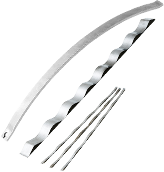Question Ohata 2007/1/10(Wed) 20:31
Please give me some information about the piano wire.
Up to now, the springs made of piano wires have always been tempered. However, I’ve recently heard that the piano wire is usually not tempered. Does it change the fatigue condition or the piano wire’s characteristic a lot?
Also, the heat-resistant temperature of the piano wire is 100 degrees when used under high temperatures. Is it possible that the heat-resistant characteristic is improved and the fatigue is reduced by tempering?
Answer Tokai Spring 2007/1/12(Fri) 10:54
Thank you for your question, Ohata!
Materials with spring strength are annealed at low temperatures after the spring coiling process. The materials here are piano wires, hard steel wires, oil tempered wires, heat-treated steel strips, stainless steel wires/plates for springs, and non-ferrous metal wires/plates for springs. The purpose of this process is to remove the strain (residual stress) generated by coiling to some extent and to improve the mechanical properties of the materials. This process improves cold-formed springs’ sagging resistance and fatigue properties.
However, please note that the heat-resistant characteristic is not increased by this process!
We are happy to answer any inquiries regarding technology, specifications, materials, etc. Please feel free to ask.

















